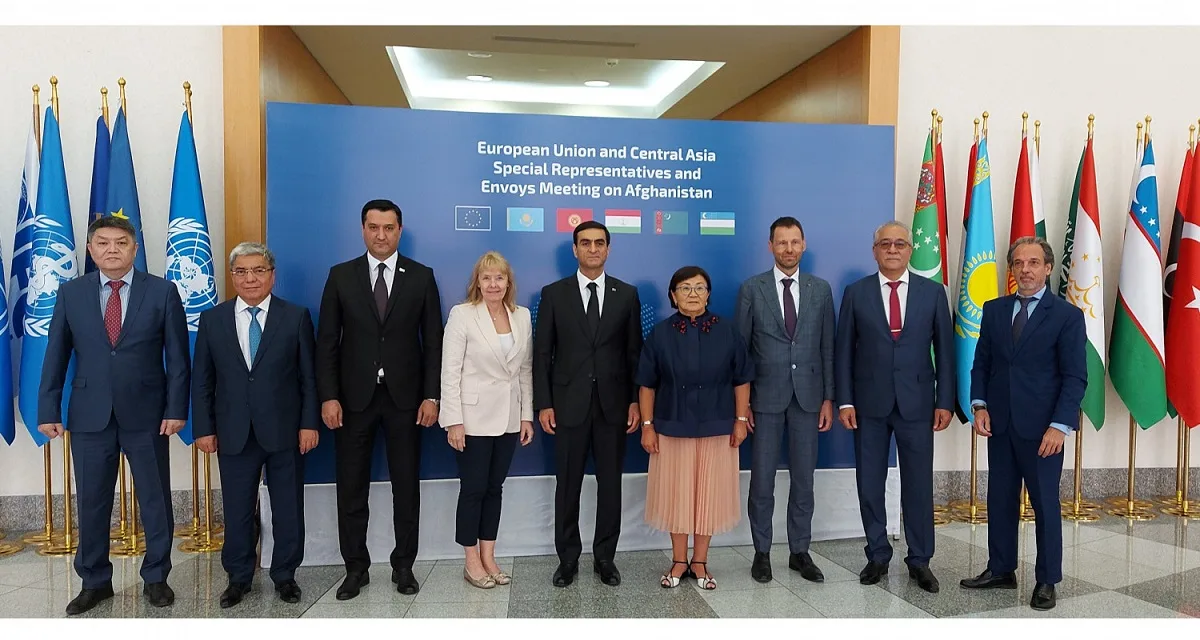ASHGABAT, Turkmenistan: The fourth meeting of the EU and Central Asia Special Representatives and Special Envoys for Afghanistan in the “CA-EU” format was held at the Foreign Ministry of Turkmenistan in Ashgabat on May 26.
The forum was attended by Special Representatives and Special Envoys of the EU, Kazakhstan, Kyrgyzstan, Tajikistan, Turkmenistan and Uzbekistan for Afghanistan and the EU Special Representative for Central Asia, the Special Representative of the Secretary-General for Afghanistan and Head of the UN Assistance Mission in Afghanistan R.Otunbayeva, the Ambassador of Turkmenistan to Afghanistan, the Consuls General of Turkmenistan in Herat and Mazar-i-Sharif.
The Directors of the World Bank branches in Afghanistan and Kazakhstan have also participated via videoconference.
During the meeting, a detailed exchange of views took place on priority issues of regional security and development, as well as problems related to the socio-economic situation in Afghanistan.
It was noted that meetings of special representatives in this format have become regular and serve as a positive platform for developing approaches to ensuring peace and security in Afghanistan.
The current meeting provided an opportunity for an in-depth exchange of information on events and the economic situation in Afghanistan, as well as an opportunity to discuss further cooperation in areas of mutual interest.
The parties expressed their firm commitment to turning Afghanistan into a stable, peaceful and prosperous country and recognized the efforts of the international community to continue to provide assistance to the people of Afghanistan.
During the meeting, the prospects for economic stabilization and recovery of Afghanistan were discussed, the importance of creating favorable conditions for economic activity, the financial and banking sector and the restoration of the socio-economic infrastructure in Afghanistan was noted.
The participants of the meeting stressed the need to continue dialogue and cooperation within the framework of the “Central Asia – European Union” format and expressed a common opinion that in order to stabilize the political, economic and humanitarian situation in Afghanistan, a broad consolidation of the international community is necessary – the states of the world, primarily the Central Asian region, as well as authoritative international structures.
Interest was also expressed in close cooperation to implement of joint projects related to the reconstruction of Afghanistan and the integration of the country into the system of global relations.
In the end, the following Joint Statement was adopted by Special Representatives and Special Envoys for Afghanistan of the European Union, Republic of Kazakhstan, Kyrgyz Republic, Republic of Tajikistan, Turkmenistan and Republic of Uzbekistan and the EU Special Representative for Central Asia;
“The fourth meeting in the EU and Central Asia Special Representatives and Special Envoys for Afghanistan and the EU Special Representative for Central Asia format was held on May 25-26 in Ashgabat.
It provided an opportunity for an in-depth exchange on developments and economic situation in Afghanistan, and allowed to discuss continued cooperation in assisting the people of Afghanistan and intensification of cooperation in areas of common interest. During the meeting they also had an exchange with UN Secretary General’s Special Representative for Afghanistan, Head of UNAMA Roza Otunbayeva and via video link with the World Bank Country Director for Afghanistan, Melinda Good, as well as World Bank Country Director for Kazakhstan, Andrei Mikhnev.
The Special Representatives and Envoys
- Reaffirmed their strong commitment to the people of Afghanistan and to seeing Afghanistan develop into a stable, peaceful and prosperous country with long-term prospects for lasting peace.
- Recalled and reconfirmed principles and expectations expressed in previous statements following discussions in this format in Tashkent, Almaty and Brussels, including regarding the human rights and security situation.
- Underlined the importance of the establishment of an inclusive and representative government and of upholding civil, political, social economic and cultural rights of all Afghans.
- Recalled the concerns expressed in UN Security Council Resolution 2681 (2023) at the increasing erosion of human rights and fundamental freedoms and the dire economic and humanitarian situation and recognised the efforts of the international community to continue assisting the people of Afghanistan in a principled manner and in accordance with international law and universally recognized norms and principles, despite difficult circumstances.
- Urged the Taliban to lift all bans on Afghan girls and women restricting their rights to education, work and participation in public life. These bans – beyond being serious human rights violations – are having detrimental effects on the ability of the international community to deliver humanitarian aid to the Afghan people, and need to be lifted for the Afghan economy to prosper, and ultimately for Afghanistan to achieve long-term stability and peace.
- Discussed prospects and challenges for economic stabilization and recovery of Afghanistan, noting the importance of favourable conditions for economic activity, the financial and banking sector and the restoration of social-economic infrastructure in Afghanistan being created, which would allow for further assistance by the international community.
- The participants called on the Taliban to prevent the Afghan territory from being used as a safe haven for hosting, planning, training, financing or exporting terrorism and violent extremism to other countries.
- Negative spill-over effects from Afghanistan, such as terrorism, violent extremism, drug trafficking and other illicit crossborder activities, will negatively impact the region. Also, the use of shared natural resources has to take the needs of all neighbours into account. Participants welcomed the efforts by the regional countries and organisations, as well as international partners, to prevent and address such developments.
- Given the shared goal of wanting to see peace and stability in Afghanistan and the region, the participants highlighted the need for continued dialogue and cooperation among the participants of this format and the wider international community.
- The participants agreed to continue meeting in this regional format on a regular basis at alternating venues as a platform for consultation, coordination and cooperation, and supported the proposal to hold the next meeting in the autumn.”
